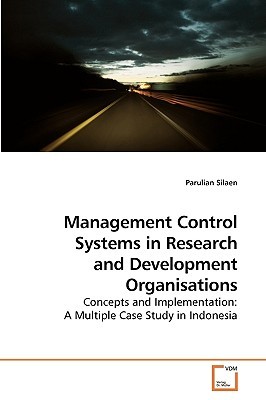
- We will send in 10–14 business days.
- Author: Parulian Silaen
- Publisher: VDM Verlag
- ISBN-10: 3639084764
- ISBN-13: 9783639084764
- Format: 15.2 x 22.9 x 1.1 cm, minkšti viršeliai
- Language: English
- SAVE -10% with code: EXTRA
Management Control Systems in Research and Development Organisations (e-book) (used book) | bookbook.eu
Reviews
Description
R&D units have different characteristics compare to non-R&D units. The R&D activity is a learning process, and a non-repetitive task which contributes to new knowledge, hence it needs different Management Control Systems (MCS). This book presents a new MCS framework that consists of four core elements: Desired Ends, Actors, Control Implementation, and Control Tools. The Desired Ends has two components; Yardstick and Direction. The Actors consists of five components; Behavioural, Motivational, Domination, Power and Decision Space. The Control Implementation has two components; Control Types and Timing, where the Control Types has both Formal and Informal types, and Timing has three stages; Input, Process and Output. The Control Tools has two components; Dimension and Value. The framework is then investigated in government R&D units in Indonesia using descriptive case study research. The practice of MCS was found to be an archaic and centralised system. It may be influenced by the nature of the R&D as well as historical, political, and cultural background. The use of control types, tools and dimension was found to be different in input, process and output control.
EXTRA 10 % discount with code: EXTRA
The promotion ends in 21d.14:28:31
The discount code is valid when purchasing from 10 €. Discounts do not stack.
- Author: Parulian Silaen
- Publisher: VDM Verlag
- ISBN-10: 3639084764
- ISBN-13: 9783639084764
- Format: 15.2 x 22.9 x 1.1 cm, minkšti viršeliai
- Language: English English
R&D units have different characteristics compare to non-R&D units. The R&D activity is a learning process, and a non-repetitive task which contributes to new knowledge, hence it needs different Management Control Systems (MCS). This book presents a new MCS framework that consists of four core elements: Desired Ends, Actors, Control Implementation, and Control Tools. The Desired Ends has two components; Yardstick and Direction. The Actors consists of five components; Behavioural, Motivational, Domination, Power and Decision Space. The Control Implementation has two components; Control Types and Timing, where the Control Types has both Formal and Informal types, and Timing has three stages; Input, Process and Output. The Control Tools has two components; Dimension and Value. The framework is then investigated in government R&D units in Indonesia using descriptive case study research. The practice of MCS was found to be an archaic and centralised system. It may be influenced by the nature of the R&D as well as historical, political, and cultural background. The use of control types, tools and dimension was found to be different in input, process and output control.


Reviews